This programme is organised and funded by:


This library offers a curated collection of resources from ECT WASH (Environmental Sound and Climate Resilient Transformation of Humanitarian WASH) Programme that is implemented by Arbeiter-Samariter-Bund (ASB), arche noVa (AN), German Toilet Organisation (GTO) and their partners in Niger, Mali, Somalia, Somaliland, Ethiopia, Myanmar, Philippines, Indonesia, Bangladesh, Lebanon, Iraq, Nicaragua, Honduras, and Haiti.
This programme intends to contribute to the practical implementation of WASH-related global commitments and strategies by fostering universal access to clean water and sanitation, promoting inclusive, climate-sensitive and environmentally conscious WASH approaches, and strengthening humanitarian preparedness, early warning and anticipatory action in areas most affected by disasters and climate change.
Easily accessible through clickable links and QR codes, it includes lessons learned, fact sheets, guidelines, story of changes, best practices, and more.
Click on the categories below to explore.


Monitoring Rainfall for Climate Resilience in Nicaragua
The ECT WASH programme in Nicaragua strengthens climate resilience through community-based rainfall monitoring, improved water access, and disaster preparedness. Agroclimatic Youth Networks empower local communities to track rainfall, integrate traditional and scientific knowledge, and share data for early warning systems. By training local actors and promoting watershed conservation, the project ensures sustainable WASH services and builds adaptive capacity against climate change impacts.
Country: Nicaragua
Organisation(s): ASB Latin America
Language: English
Short Link: https://bit.ly/nic-fact
Scan Here


Climate Risk Assessment and Green Humanitarian Aid in Somalia
In Somalia, climate risk assessments using NEAT+ are improving WASH planning and sustainability. Training workshops and participatory screenings enable local actors to identify environmental risks, integrate nature-based solutions, and adopt Green Humanitarian Aid principles. By fostering local ownership and building capacity for anticipatory action, the initiative strengthens climate resilience in fragile areas affected by drought, floods, and displacement.
Country: Somalia
Organisation(s): arche noVa
Language: English
Short Link: https://bit.ly/som-fact
Scan Here


Participatory Community Risk Assessment for Climate-Resilient WASH in Indonesia
In Indonesia, communities in Gunung Kidul and Magelang face increasing climate risks like droughts, floods, and landslides that disrupt WASH systems. A participatory approach combines local knowledge with scientific data through inclusive risk assessments, mapping, and scenario planning. This strengthens early warning systems, anticipatory action, and climate-sensitive DRR integration into village plans, ensuring sustainable, inclusive WASH services and long-term community resilience.
Country: Indonesia
Organisation(s): ASB S-SEA
Language: English
Short Link: https://bit.ly/idn-fact
Scan Here


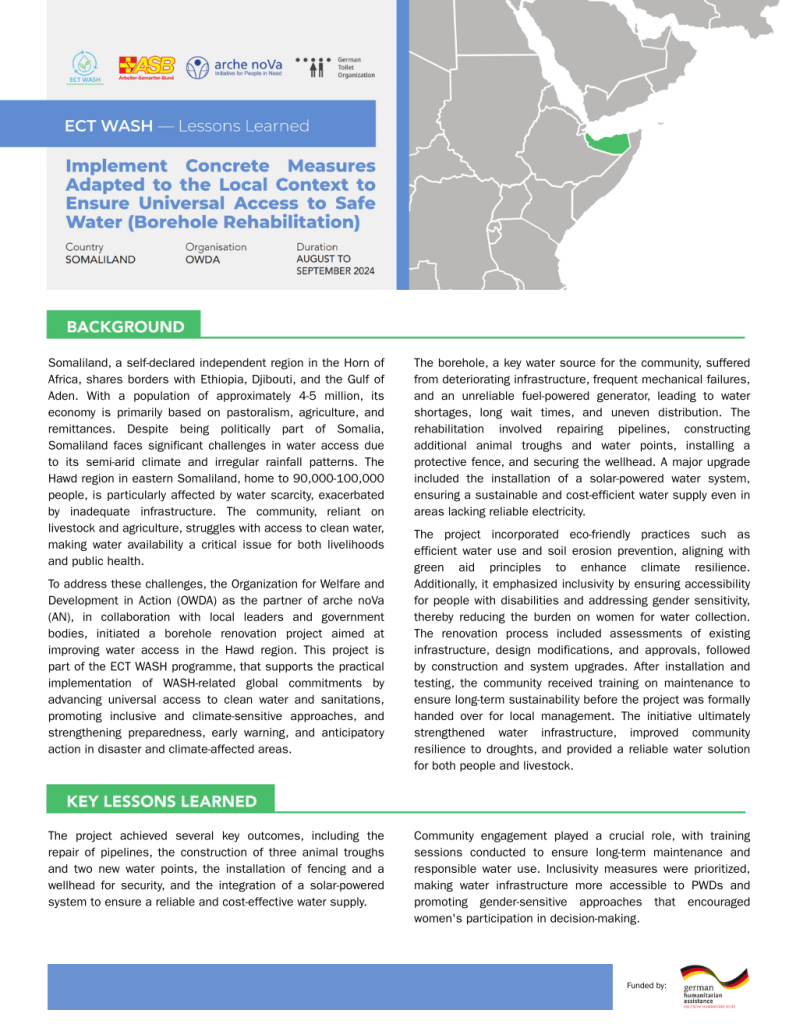
In Somaliland’s drought-prone Hawd region, water once meant long walks and uncertainty. Through the ECT WASH programme, OWDA and arche noVa revived an old borehole with solar power, turning scarcity into sustainability. The project brought clean water to families and livestock, eased the burden on women, and empowered persons with disabilities to access water safely. Despite remote terrain and delays, the community’s ownership ensured lasting change and resilience.
Country: Somaliland
Organisation(s): arche noVa, OWDA
Language: English
Short Link: https://bit.ly/soml-bore
Scan Here

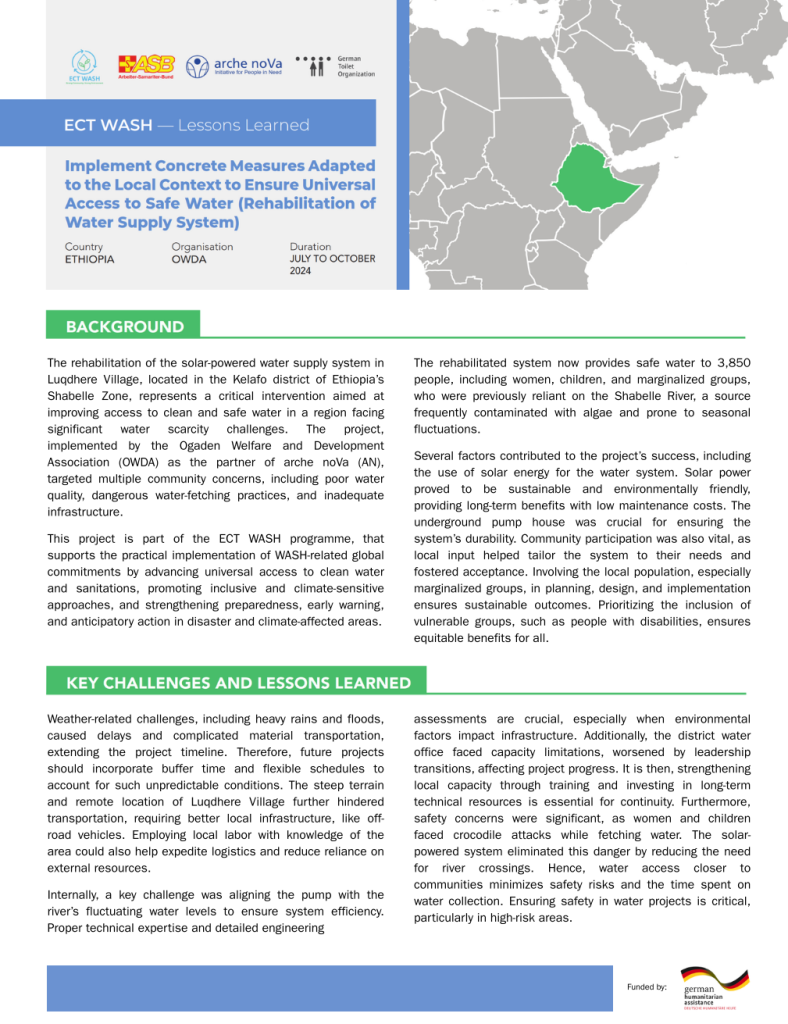
In Luqdhere Village, Ethiopia, fetching water once meant risking lives—women and children faced crocodile attacks at the river. That changed when OWDA and arche noVa brought a solar-powered water system to the community. Powered by the sun and shaped by local voices, the project now provides safe water to 3,850 people. Despite floods and rough terrain, teamwork and resilience turned challenges into lessons on sustainability, inclusion, and the power of community-led change.
Country: Ethiopia
Organisation(s): arche noVa, OWDA
Language: English
Short Link: https://bit.ly/eth-water
Scan Here
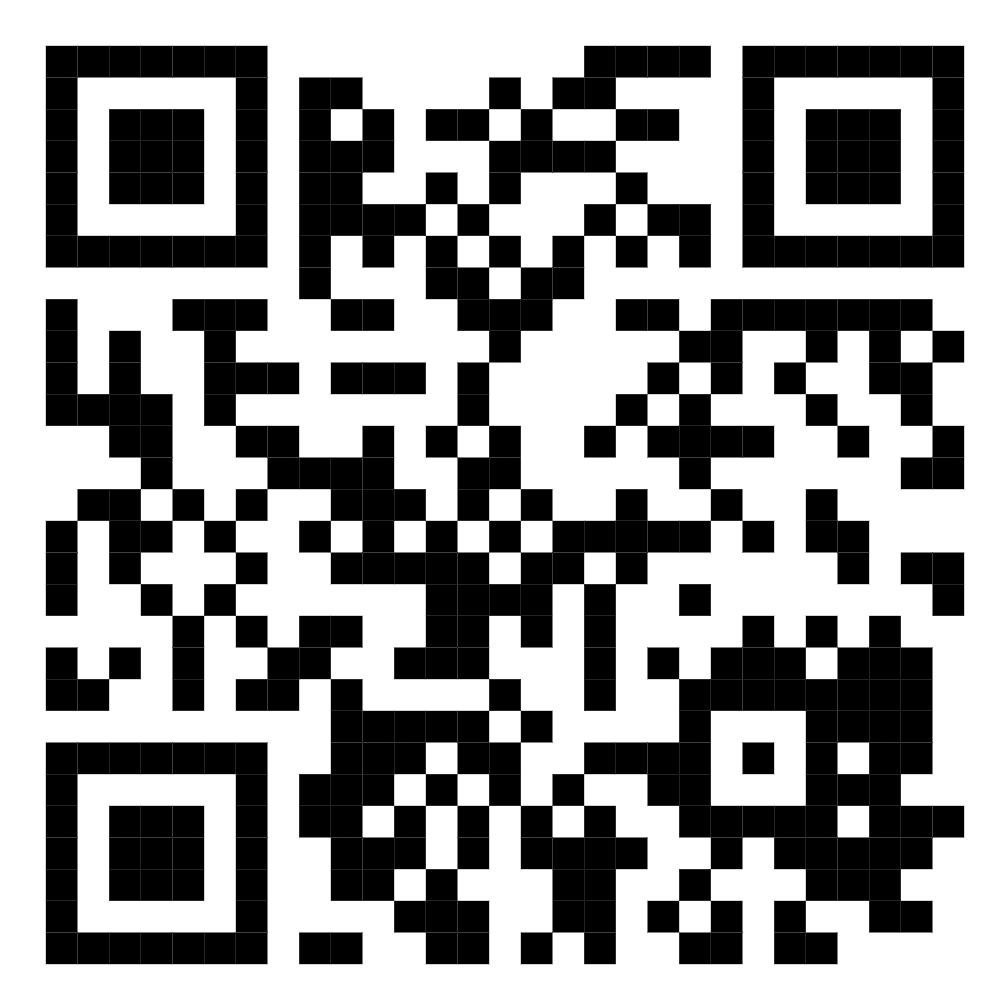
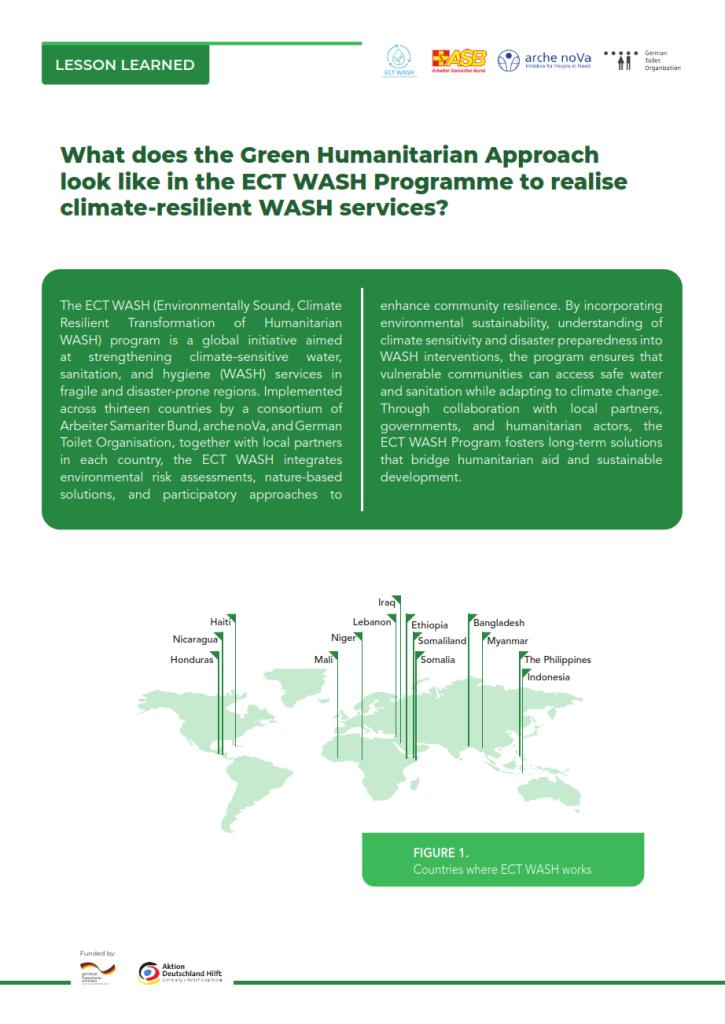
Through its green humanitarian approach, the ECT WASH program ensures water, sanitation, and hygiene services are both sustainable and climate-ready. It promotes solutions such as NEAT+ assessments, solar water systems, rainwater harvesting, and eco-friendly waste practices. By doing so, the program minimizes environmental harm and builds stronger community resilience, proving that protecting people and nature can go together.
Country: Global
Organisation(s): Arbeiter-Samariter-Bund, arche noVa, German Toilet Organisation
Language: English
Short Link: https://bit.ly/glo-green
Scan Here
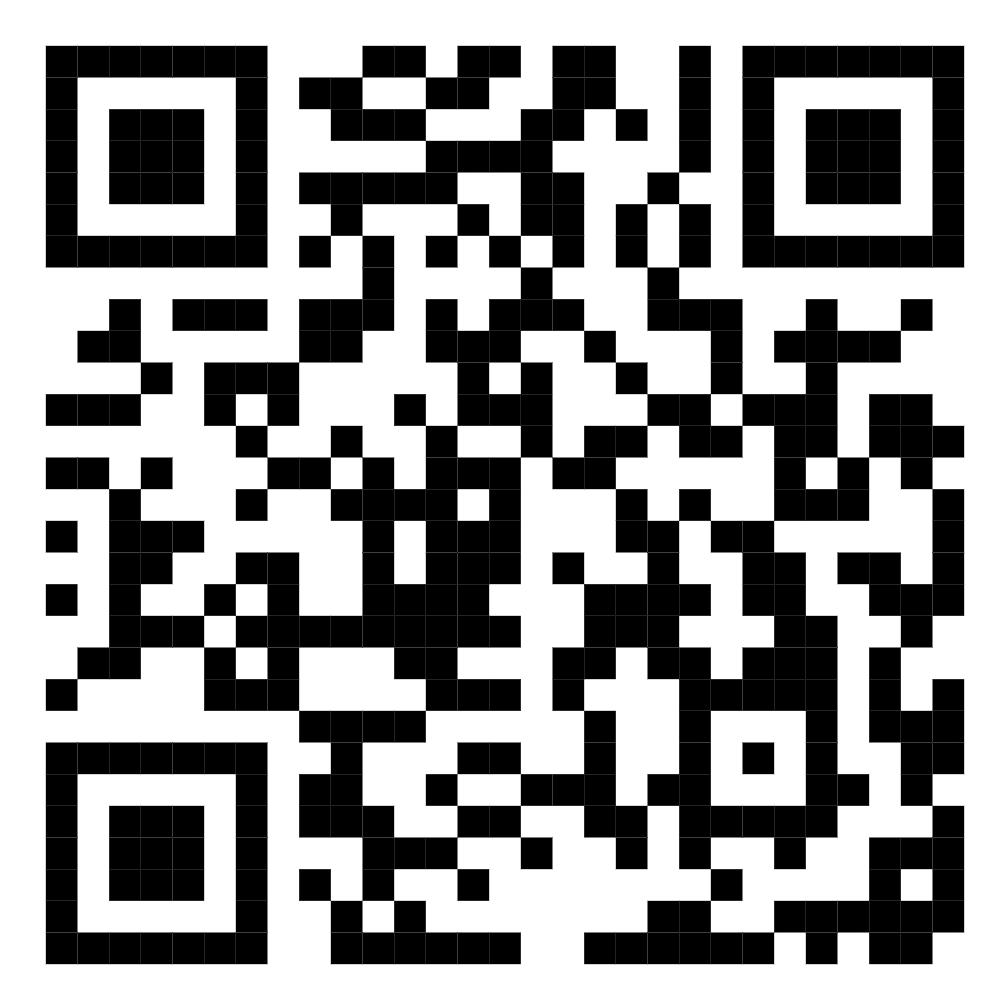
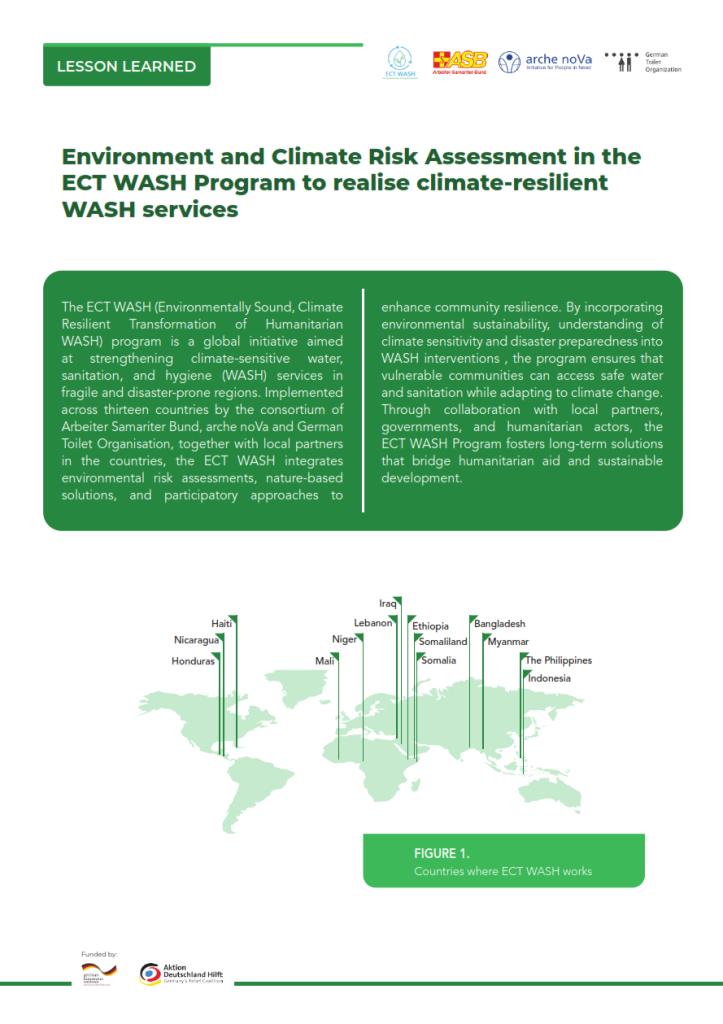
The ECT WASH program strengthens climate-resilient water, sanitation, and hygiene services in disaster-prone countries. By using tools like NEAT+ and involving communities, it identifies risks such as droughts, floods, and waste issues, then develops sustainable solutions like rainwater harvesting and better waste management. Despite challenges, its participatory approach builds local resilience and long-term impact.
Country: Global
Organisation(s): Arbeiter-Samariter-Bund, arche noVa, German Toilet Organisation
Language: English
Short Link: https://bit.ly/glo-neat
Scan Here


Strengthening Local Climate-Sensitive and Universal WASH Capacities Using and Disseminating the Green Humanitarian Aid Approach
In Somalia, workshops highlighted the value of beginning projects with environmental assessments and tailoring training to local realities. Interactive exercises made sustainability principles easier to apply, while political barriers revealed the need for flexible approaches like online training. Strong community involvement and knowledge sharing fostered ownership, and follow-up combined with advocacy helps carry these lessons into future humanitarian work.
Country: Somalia
Organisation(s): arche noVa
Language: English
Short Link: https://bit.ly/som-neat
Scan Here


Conduct of NEAT+ with Communities in Southern Leyte and Maguindanao Provinces
NEAT+ was applied in Southern Leyte and Maguindanao to integrate environmental considerations into WASH and disaster risk reduction. Community and LGU engagement identified risks and informed mitigation strategies. Key lessons highlight preparation, clear communication, and better data systems. Successes include eco-friendly hygiene kits, reduced single-use plastics, and accessible rainwater harvesting systems, promoting sustainability, resilience, and inclusivity in line with Sphere standards.
Country: Philippines
Organisation(s): ASB S-SEA, ACCORD
Language: English
Short Link: https://bit.ly/phl-neat
Scan Here


Institutionalizing the Climate and Environment Charter at ASB S-SEA
ASB S-SEA institutionalized the Climate and Environment Charter to strengthen climate action in humanitarian work, addressing gaps in knowledge and practice. Efforts included awareness campaigns, internal policy integration, translation into Bahasa Indonesia, and collaboration with local governments. Key successes include drafting six climate action targets, promoting eco-friendly practices like water reuse and tree planting, and influencing partner engagement for sustainability.
Country: Indonesia
Organisation(s): ASB S-SEA
Language: English
Short Link: https://bit.ly/idn-charter
Scan Here


NEAT+
The ECT WASH programme in Myanmar used NEAT+ to integrate environmental considerations into WASH services across conflict-affected areas in Kachin State. Despite challenges like roadblocks, supply disruptions, and low community awareness, the project achieved key milestones: training field teams, translating NEAT+ into local language, and incorporating mitigation strategies into WASH designs. Community engagement improved ownership and sustainability, aligning interventions with environmental and local needs.
Country: Myanmar
Organisation(s): arche noVa, SMDO, EEI
Language: English
Short Link: https://bit.ly/myr-neat
Scan Here


Inclusive preparedness and Immediate Response for Cyclone 'REMAL 2024'
In Sarankhola, Bangladesh, an inclusive initiative strengthened disaster preparedness and response for Cyclone Remal 2024, prioritizing vulnerable groups, especially persons with disabilities. Key achievements included early warning dissemination through SHGs, immediate support to 300 households, and promoting gender equity and accessibility. Lessons emphasize the need for inclusive shelters, nature-based solutions, renewable energy, and stronger coordination to build long-term resilience.
Country: Bangladesh
Organisation(s): ASB S-SEA, CDD
Language: English
Short Link: https://bit.ly/bgd-remal
Scan Here



Sustainable Office Practices; A Guide to Greening Your Workplace as a Humanitarian Organisation
This guide helps humanitarian organizations reduce their office carbon footprint and adopt sustainable practices. It provides strategies for energy efficiency, waste reduction, water conservation, green transport, and eco-friendly events. It emphasizes leadership commitment, green policies, staff training, and resource monitoring using KPIs. Practical tips cover energy use, waste, water, and sustainable procurement, promoting a culture of environmental responsibility and compliance with global climate commitments.
Country: Global
Organisation(s): Arbeiter-Samariter-Bund, arche noVa, German Toilet Organisation
Language: English
Short Link: https://bit.ly/sustain-office
Scan Here



IMPACT REPORT 2024-2025
The 2024–2025 Impact Report highlights progress in climate-resilient and inclusive humanitarian WASH across 13 countries, benefiting over 422,000 people. Key actions include solar-powered water systems, nature-based filtration, inclusive sanitation, and NEAT+ risk assessments. The program emphasizes gender equality, disability inclusion, and community-led solutions, while integrating climate adaptation and disaster preparedness into WASH services to build long-term resilience and sustainability.
Country: Global
Organisation(s): Arbeiter-Samariter-Bund, arche noVa, German Toilet Organisation
Language: English
Short Link: https://bit.ly/ect-impact
Scan Here



Transformation of Ngalang Village Towards Inclusive and Disaster Resilient Village
Ngalang Village in Gunungkidul, Indonesia, transformed into an inclusive and disaster-resilient community through strong local leadership and community participation. Key actions included reorganizing disaster risk reduction into preventive measures, installing 70 household septic tanks, and making public facilities accessible for all, including persons with disabilities. This change reflects adaptive governance, collaboration with partners, and a commitment to sustainability and inclusivity.
Country: Indonesia
Organisation(s): ASB S-SEA
Language: English
Short Link: https://bit.ly/idn-suharyanta
Scan Here

